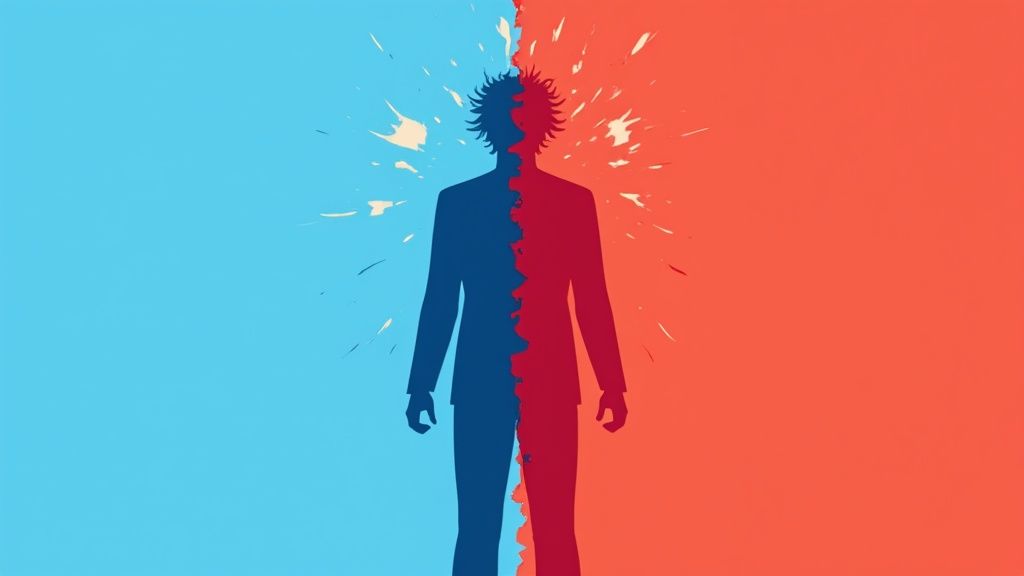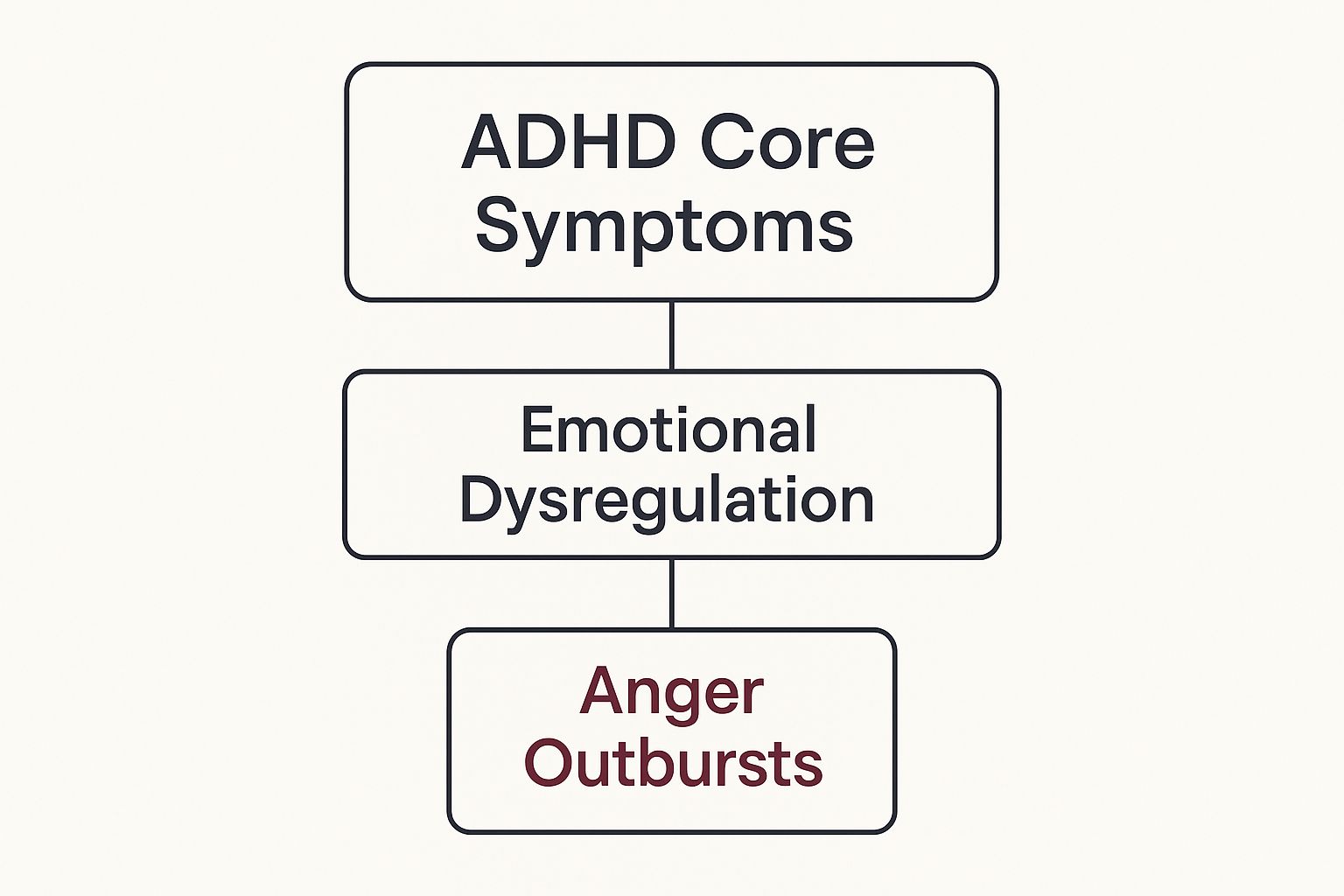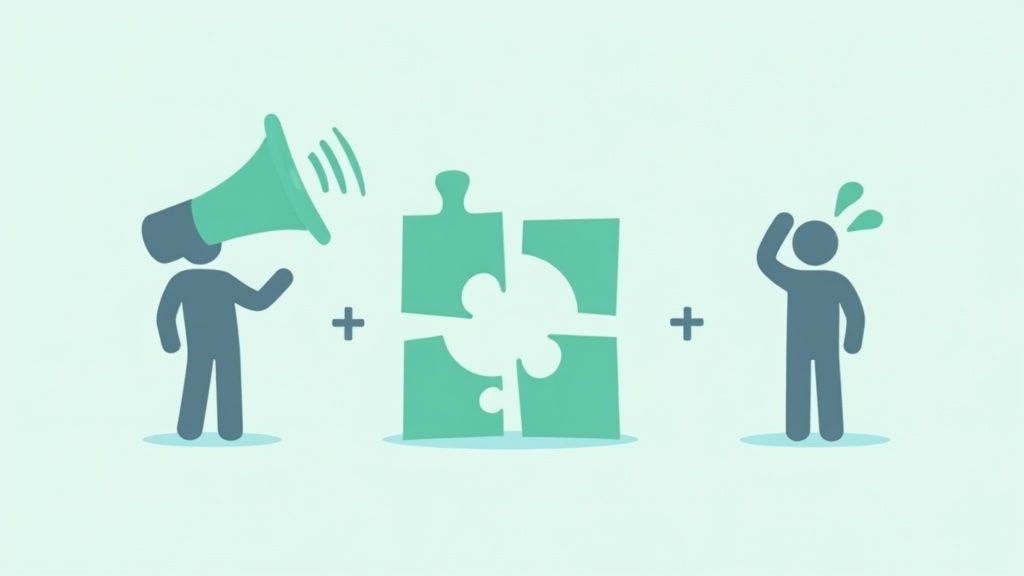If you have ADHD, the link between your brain and your temper can feel intensely personal. That sudden flash of frustration or an outburst that seems to come out of nowhere isn't a reflection of your character—it's a neurological reality. The intense feelings are often a direct result of the unique wiring of the ADHD brain, where challenges with impulse control and emotional regulation create a perfect storm.
The Neurological Link Between ADHD and Anger

Feeling misunderstood about your anger is a common experience for people with ADHD. It's so important to recognize that these powerful emotional responses aren't a choice, but a symptom. The ADHD brain simply processes emotions differently, often with a much greater intensity that can feel overwhelming and nearly impossible to manage in the moment.
Think of your brain's emotional control center as a car's braking system. In a neurotypical brain, the brakes respond smoothly and predictably when you need them. In an ADHD brain, however, those brakes can be far less reliable. An impulse—especially anger—can go from zero to sixty before that braking system even has a chance to engage.
Why Emotional Control Is Different with ADHD
The root of this challenge lies in executive functions, the set of mental skills that help you navigate daily life. For individuals with ADHD, these functions are often impaired, which has a direct impact on emotional control in a few key ways:
- Emotional Dysregulation: This is a core issue where the brain struggles to moderate emotional responses. A minor frustration that someone else might easily brush off can feel monumental, triggering a reaction that seems completely disproportionate to the situation.
- Impulsivity: A hallmark symptom of ADHD, impulsivity means acting first and thinking later. This trait causes emotions to surface explosively, often leading to an outburst before you've had a moment to process what's happening.
- Reduced Frustration Tolerance: People with ADHD often have a lower threshold for frustration. Tasks that require sustained mental effort or dealing with unexpected roadblocks can quickly become sources of intense irritation and anger.
This neurological setup means that the intense anger you feel isn't a flaw in your character. It’s a direct consequence of how your brain is wired to handle emotional input and executive tasks.
Understanding this connection is the first and most powerful step toward getting a handle on it. It shifts the entire narrative away from self-blame and toward proactive, compassionate management.
When you acknowledge the biological reasons behind ADHD and anger, you can start exploring strategies that work with your brain's unique structure, not against it. This guide is designed to give you the framework to do just that.
Why the ADHD Brain Is Wired for Outbursts
To really get to the bottom of the ADHD-anger connection, we have to look at how the brain is actually wired. This isn't about having a "short temper." It's about a fundamental difference in how your brain handles information, puts the brakes on impulses, and keeps emotions in check. These neurological realities create a biological setup for intense emotional reactions.
Picture your brain's executive functions as an air traffic control tower. In a neurotypical brain, that tower is well-staffed and efficiently directs all the incoming and outgoing signals, keeping everything moving smoothly. In an ADHD brain, however, the air traffic controller is often overwhelmed, understaffed, and working with spotty equipment. Emotional signals like frustration or annoyance can easily pile up and collide, causing a total system overload.
This is exactly why something that seems minor can trigger a major emotional explosion. The brain just doesn't have the resources to manage all the incoming emotional traffic.
When the 'Stop and Think' Switch Breaks
A core challenge for the ADHD brain is something called response inhibition. This is that crucial "stop and think" moment that’s supposed to happen between feeling an emotion and acting on it. For someone with ADHD, this internal brake pedal is a lot less reliable.
An angry feeling can fly right past the usual checkpoints and turn directly into a sharp comment or physical outburst before you've even had a second to process what’s happening. This isn't a choice; it's a neurological reflex firing off at lightning speed.
On top of that, difficulty with attentional control plays a huge part. Once a negative or frustrating thought pops into your head, it can be incredibly hard to shift your focus to something else.
This creates an emotional feedback loop you can't escape. The brain gets stuck on the thing that made you angry, replaying it over and over, letting the frustration build with no off-ramp. Each replay just amps up the feeling, making an outburst more and more likely.
A 2017 neuropsychological study backed this up, finding a direct link between the difficulty in shifting attention and higher levels of anger. People with ADHD struggle to pull their focus away from frustrating things, which makes their anger last longer and feel more intense. This research shows how anger in ADHD isn't a personality flaw—it's tied directly to these core cognitive functions. You can dive deeper into the study's findings on the neuropsychology of anger and ADHD.
How Brain Biology Shows Up in Real-World Frustration
This unique wiring has very real consequences in daily life. When your brain is constantly working overtime just to manage basic tasks, stay focused, and control impulses, your internal battery drains much, much faster.
This can create a state of constant internal friction, leaving you feeling:
- Chronically Overwhelmed: A simple to-do list can feel like climbing a mountain, leading to a persistent feeling of being stressed and behind.
- Easily Frustrated: Because tasks require so much more mental energy, your patience for setbacks, interruptions, or small mistakes is paper-thin.
- Frequently Misunderstood: Trying to explain why a "small thing" feels so huge is exhausting. It can make you feel isolated and defensive.
These daily struggles aren't just you overreacting to stress; they are direct results of how the ADHD brain is built. For many, seeing this connection is a huge "aha" moment. It reframes the whole experience—it's not a personal failure, it's a biological reality. That shift in perspective is the first real step toward finding strategies that actually work.
Recognizing Your Unique ADHD Anger Triggers
Knowing the brain science behind ADHD anger is a huge step. But the other, equally important piece of the puzzle is figuring out what actually lights the fuse in your everyday life. For those of us with ADHD, anger triggers often aren't just minor annoyances—they're specific, intense, and tied directly to the core challenges of the condition.
Think of your emotional battery for the day. A neurotypical person might wake up with a 100% charge. But someone with ADHD? We often start the day at 70% because our brains are already working overtime just to manage focus, impulses, and the constant internal chatter. It means our battery drains a lot faster, leaving us vulnerable to things that others might just brush off.
This diagram does a great job of showing how this chain reaction works—from core ADHD symptoms to emotional dysregulation, and finally, to those explosive moments of anger.
It’s a powerful visual reminder that the anger isn’t the problem itself. It's the final, visible symptom of a much deeper neurological process.
Common but Powerful ADHD Triggers
While everyone's triggers are a bit different, a lot of people with ADHD will recognize some familiar patterns. Spotting these in your own life is the first real step toward getting ahead of the emotional tidal wave.
Lots of us get tripped up by the same kinds of things. Do any of these sound familiar?
- Sensory Overload: You walk into a grocery store and it’s an assault. The buzzing fluorescent lights, the squeaky cart wheel, the competing announcements over the loudspeaker—it's too much. Your brain goes into system overload, and that simple errand suddenly feels like an infuriating ordeal.
- Unexpected Plan Changes: A friend cancels dinner at the last minute. It shouldn’t be a big deal, but it feels like a personal slight. That's because our brains struggle with mental flexibility. We’ve already locked onto one path, and being forced to pivot so abruptly feels jarring and incredibly frustrating.
- Executive Function Overwhelm: You stare at a mountain of laundry or a massive to-do list, and you just… freeze. You have no idea where to even start. That feeling of paralysis can quickly curdle into anger—at the tasks, at the world, and most often, at yourself for not being able to "just do it."
To make this clearer, let's connect some common triggers to the underlying ADHD traits that cause them.
Common ADHD Anger Triggers and Their Underlying Causes
This table breaks down some real-world scenarios and shows how they link back to specific ADHD challenges.
| Common Trigger | Example Scenario | Underlying ADHD Trait |
|---|---|---|
| Interruptions | Someone asks you a question while you're deep in focus on a work task, and you snap at them. | Hyperfocus & Difficulty with Task-Switching |
| Waiting & Delays | Getting stuck in traffic or a long line at the bank feels physically unbearable and makes you furious. | Time Blindness & Impulsivity |
| Feeling Misunderstood | You try to explain your thought process, but the other person isn't getting it, leading to immense frustration. | Working Memory Deficits & Atypical Communication Style |
| Perceived Unfairness | A coworker gets credit for your idea, or you feel a rule is being applied to you but not others. | Strong Sense of Justice & Emotional Hyperarousal |
Recognizing these connections is key. It helps shift the narrative from "I have a bad temper" to "My brain is reacting to a specific trigger in a predictable way."
The Deep Sting of Rejection Sensitivity
Perhaps the most powerful—and painful—trigger of all is something called Rejection Sensitive Dysphoria (RSD). While it’s not an official diagnosis, it’s an incredibly common and intense experience for people with ADHD. It's an extreme emotional sensitivity to the perception of being rejected, criticized, or judged.
RSD can turn a neutral comment from your boss into a full-blown personal attack in your mind. A slightly off tone from your partner can feel like a devastating betrayal. The emotional pain is so real and so immediate that the brain's only defense is to lash out—a fiery burst of anger to protect itself from the perceived wound.
This isn't just "being overly sensitive." It’s a neurological wiring issue where the brain’s emotional pain centers are on a hair-trigger.
Understanding things like RSD, sensory overload, or executive function paralysis helps you connect the dots. You can start to see the patterns between a situation and your reaction. And that awareness? That’s your best tool for finally taking back control.
How Unmanaged Anger Impacts Your Life and Relationships
The link between anger and ADHD isn't just a quiet, internal battle. Its effects ripple outward, touching every corner of your life. Unchecked emotional outbursts can put a massive strain on the people you care about most, from your partner and family to friends and colleagues.
It often creates a painful, self-perpetuating cycle. An impulsive reaction leads to social friction or even rejection, which then kicks up deep feelings of shame, guilt, and isolation. That emotional fallout doesn't just fade away—it can actually make the underlying emotional dysregulation worse, paving the way for the next outburst.
The Toll on Your Personal World
Living inside this cycle is exhausting. It can feel like you're constantly walking on eggshells, not just around others but around yourself, never quite sure what might set you off. This constant state of high alert eats away at your self-esteem and can leave you feeling profoundly misunderstood.
You might find yourself:
- Damaging relationships with loved ones who are hurt or confused by your reactions.
- Struggling professionally because of conflicts with coworkers or trouble handling workplace stress.
- Facing social isolation as people pull away, unsure how to handle unpredictable emotional responses.
The internal struggle is immense. The feeling of saying or doing something in a flash of anger, only to be flooded with regret moments later, is a heavy burden to carry. Over time, it can take a serious toll on your mental health.
The Social Impact Starting From a Young Age
This isn't just an adult problem; the social consequences can start very early on. Research shows that kids with ADHD often have a much tougher time with emotional self-control in school. Their lower frustration tolerance can make them easy targets for bullying, as peers might provoke them on purpose, knowing they're more likely to get a reaction.
This dynamic creates a difficult environment where a child feels constantly attacked and misunderstood, reinforcing the connection between their ADHD and social rejection.
Acknowledging this very real human cost is the first step. It validates the pain and difficulty of the experience, shifting the focus from blame toward empowerment. The good news? This cycle can be broken. Understanding the true impact of unmanaged anger is what makes finding effective anger management strategies for adult ADD so critical for restoring balance to your life and relationships.
Actionable Strategies for Managing ADHD Anger
Knowing the "why" behind ADHD and anger is a great first step, but real change happens when you have a practical toolkit for the heat of the moment. For someone with an ADHD brain, generic advice like "just calm down" is practically useless. What you really need are strategies that work with your unique neurology, not against it.
This is all about building a reliable set of coping mechanisms you can turn to when that familiar frustration starts to simmer. The goal isn't to pretend anger doesn't exist, but to manage its intensity and channel it in healthier ways.
Use the Pattern Interrupt Technique
When you get caught in a spiral of angry thoughts, your brain essentially gets stuck on repeat. A pattern interrupt is a simple physical or mental action you take to jolt your brain onto a completely new track. It’s like hitting the reset button on your emotional state.
Think of it like this: if your mind is a runaway train speeding toward an outburst, a pattern interrupt is the switch that suddenly diverts it to a different, much calmer destination.
Here are a few simple pattern interrupts you can try:
- Change Your Physical State: The second you feel it building, stand up. Go splash some cold water on your face. Walk into a different room. The abrupt physical shift is often enough to break the mental fixation.
- Engage Your Senses: Pop a super sour candy in your mouth, grab an ice cube and crush it in your hand, or take a deep sniff of a strong essential oil like peppermint. A powerful sensory input forces your brain's attention to shift.
- Do Something Unexpected: Start counting backward from 100 by sevens. Try to name all the state capitals you can think of. This forces your brain to switch gears from its emotional, reactive center to its logical, problem-solving one.
Create External Brains for Frustration
One of the biggest triggers for ADHD anger is the sheer frustration that comes from executive function challenges—losing track of time, forgetting important steps, feeling completely overwhelmed by a task. An "external brain" is any tool outside of yourself that helps you manage these things, lightening the cognitive load that leads to anger.
For example, if you know you get incredibly frustrated trying to assemble furniture, don't just rely on willpower to get you through it. Set a timer for 25-minute work sprints with a 5-minute break in between. This breaks the massive task into manageable chunks and prevents your frustration tolerance from hitting zero. Using apps, checklists, and visual timers are all fantastic ways to offload that mental strain.
By outsourcing executive functions to external tools, you conserve your limited mental energy for emotional regulation. This proactive approach stops many anger-inducing situations before they even start.
Developing a personalized set of tools is a huge part of building resilience. For a deeper dive into this and other methods, our guide on 7 essential coping skills for adults with ADHD offers more practical ideas.
Channel Energy Through Physical Release
The intense, buzzing energy that comes with ADHD anger has to go somewhere. If you try to just bottle it up, it often explodes later with even more force. Physical activity is one of the quickest and most effective ways to safely release this built-up emotional pressure.
This doesn't mean you need to drop everything for a full workout. Even short, intense bursts of activity can make a world of difference:
- Do 20 quick jumping jacks or push-ups.
- Take a brisk five-minute walk around the block.
- Punch a pillow or a punching bag if you have one.
- Put on your favorite high-energy song and just dance it out for three minutes.
Physical movement helps your body burn off the excess adrenaline and cortisol (the primary stress hormone) that flood your system when you're angry. It provides an immediate, healthy outlet that allows your nervous system to calm down and reset much more quickly.
Finding Professional Support for Lasting Emotional Control
While the self-help strategies we've talked about are powerful, sometimes they aren't quite enough to create lasting change when you're dealing with the intense connection between anger and ADHD. Think of it this way: self-help strategies are like managing the day-to-day weather, while professional treatment helps adjust the underlying climate. It’s about creating a more stable internal baseline so that managing your emotions doesn't feel like a constant, uphill battle.
The goal here is to get you on a clear path with evidence-based treatments that address the neurological roots of emotional dysregulation. For many people, the most effective support system turns out to be a combination of medication and therapy.
The Role of Medication in Emotional Stability
For many with ADHD, medication can be a total game-changer. It works by improving the brain's fundamental ability to manage impulses and maintain focus. It doesn't get rid of your emotions, but it can create that crucial pause—that split second you need to respond thoughtfully instead of just reacting.
There are two main types of medication that can help:
- Stimulant Medications: These work by boosting the levels of key neurotransmitters, which helps different parts of the brain talk to each other more effectively. The result is often better executive function and a much calmer emotional state.
- Non-Stimulant Medications: These have a different mechanism but can also improve focus and dial down impulsivity, usually with a more gradual effect. They're a great option for anyone who doesn't respond well to stimulants.
Therapy Designed for the ADHD Brain
Therapy is where you build the skills to navigate the emotional landscape that medication helps stabilize. Cognitive Behavioral Therapy (CBT), especially when it's adapted for the ADHD brain, has proven to be incredibly effective. It's all about learning to spot and reframe those automatic negative thoughts that so often fuel anger.
By learning to challenge those thoughts, you can start to dismantle emotional triggers before they have a chance to escalate into a full-blown outburst. It’s a process that helps you build a more resilient and compassionate inner dialogue.
Emotional dysregulation—including anger—is now seen as a core feature of ADHD, affecting roughly 70% of adults with the condition. Even though it's not an official diagnostic symptom, its impact is undeniable. It comes directly from the brain's struggle with frustration tolerance and impulsivity. You can read more about how emotional dysregulation is a central part of ADHD to see just how significant it is.
Working with a professional is the best way to develop a plan that addresses all these interconnected issues. And since communication breakdowns can be a major source of frustration, figuring out how to solve ADHD communication problems is another critical piece of the puzzle.
Frequently Asked Questions About Anger and ADHD
When you're trying to understand the link between anger and ADHD, a lot of questions can pop up. It's a complex topic, and getting clear answers can make a world of difference. Here are some of the most common questions we hear, answered directly.
Is Anger an Official Symptom of ADHD
That's a great question, and the technical answer is no. Anger isn't listed as a core symptom in the official diagnostic manual, the DSM-5.
However, emotional dysregulation—which absolutely includes intense irritability and a very low frustration tolerance—is widely recognized by experts as a central part of ADHD. This emotional intensity isn't a character flaw; it's a direct result of the executive function challenges that come with an ADHD brain. For many, it's one of the most difficult parts of their daily experience.
How Can I Explain My ADHD Anger to My Partner
Trying to put this into words for someone you love can be tough. Analogies can really help bridge the gap.
You could try explaining it like this: your brain's "emotional braking system" isn't as reliable as a neurotypical person's. It’s not that you want to get angry or that you don't care, but the impulse often floods your system before you even have a chance to hit the brakes.
The key is to frame it as a neurological challenge, not a personal failing or a reflection of how you feel about them. Sharing an article or a short video that explains the science behind it can also help build that crucial bridge of understanding and empathy.
Are There Specific Medications Just for ADHD Anger
There aren't any medications designed specifically for "ADHD anger." Instead, the standard, evidence-based medications for ADHD often have the powerful side effect of improving emotional regulation.
Both stimulant and non-stimulant medications work by improving focus, impulse control, and overall executive function. When these systems are working better, it gives your brain the critical pause it needs to process feelings before reacting. For many people, this can dramatically dial down the frequency and intensity of angry outbursts.
At the Sachs Center, our specialists are experts in diagnosing and treating the nuanced ways ADHD shows up, including its very real impact on emotional health. If you're ready to get diagnostic clarity and a personalized plan that works for you, book an evaluation with our compassionate team today.


